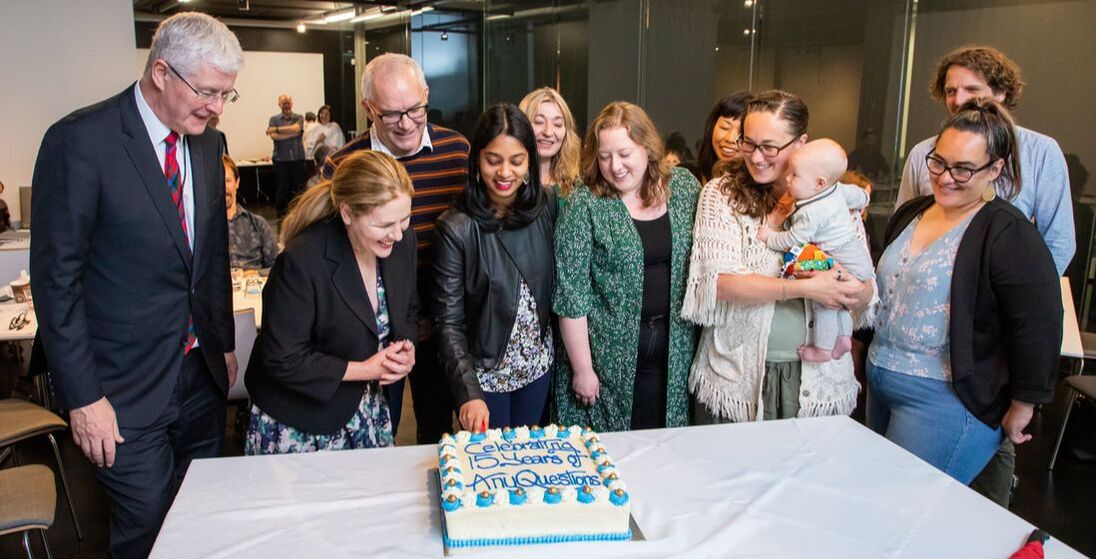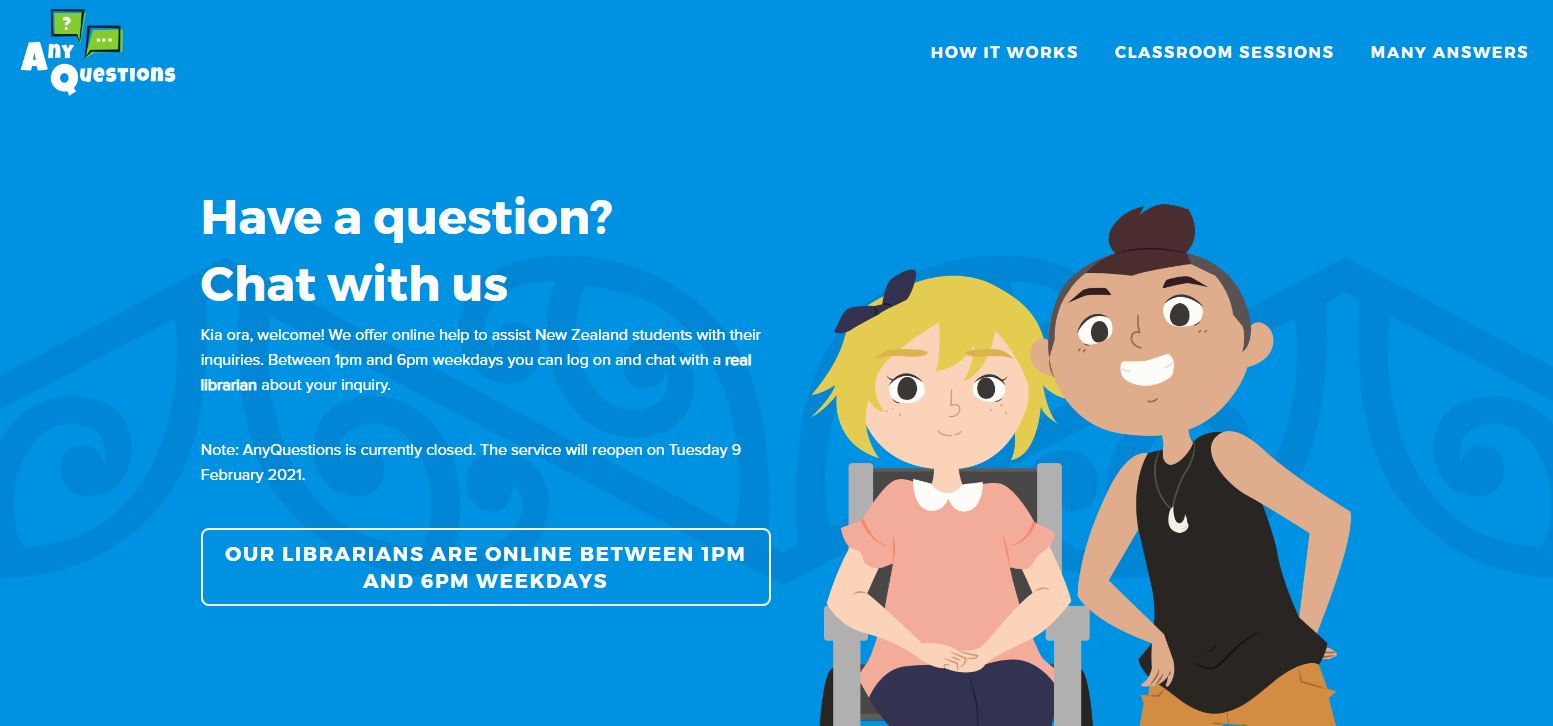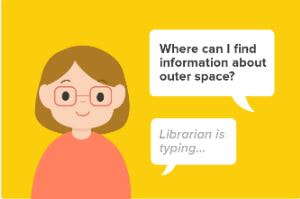Celebrating Fifteen years of AnyQuestions
AnyQuestions is a free online reference service for all New Zealand school students accessed via a live, text-based, chat. The service is open 1–6:00 pm on weekdays to help students with research questions. The aim of the service is not to give students the answer, rather teach them valuable information literacy skills so they can find the information for themselves.
Via the online text-based chat, AnyQuestions librarians work with students to unpack their questions, uncovering what their real need is before guiding them to quality online resources. As part of the 15th-anniversary celebrations of AnyQuestions, Helen Heath spoke to Amy Jacob, Service Manager to find out more about this incredible service.
Via the online text-based chat, AnyQuestions librarians work with students to unpack their questions, uncovering what their real need is before guiding them to quality online resources. As part of the 15th-anniversary celebrations of AnyQuestions, Helen Heath spoke to Amy Jacob, Service Manager to find out more about this incredible service.
Kia ora Amy and thanks for talking with Library Life magazine. Firstly, happy birthday to AnyQuestions! Fifteen years is a wonderful achievement.
Thank you! We think so too.
Diving right in, I’m really curious about how many are on the team answering questions, also where are they all based?
We have close to 200 operators that are based in our 16 partner libraries around the country. The Wellsford War Memorial Library is the most northern partner library and Invercargill Public Library is the furthest South. SLANZA is one of our associate partners as well, they are helping spread the word about our services to schools.
That’s much bigger than I realised! What is your role in all of this?
AnyQuestions is led and run by the National Library’s Services to Schools; funded by the Ministry of Education, and supported by partner libraries. I’m the Service Manager so my role involves managing our relationship with the Ministry and our partners, developing and delivering training, maintaining the AnyQuestions platforms, reporting, promoting AnyQuestions, looking after the day to day running of the service, and the list goes on.
That’s really interesting. I was going to ask what kind of background is needed to work as an operator – I wondered if there any ex-teachers on the team?
Quite a few public librarians have a teaching background but, most of the time, the librarians involved are in children and youth librarian roles so they have experience working with students. Mainly, the operators just need to be motivated and enthusiastic about working with young people. Everything else is covered in their training.
That makes a lot of sense. How much tracking of the conversations takes place?
My team and I get to see all the transcripts of the chats. We have a transcript review process where we review operator chats by comparing them against reference standards and provide detailed feedback to individual operators. That way we can ensure they are performing well as operators. It’s very structured, not just any librarian can come online and chat with students. We provide training when they first begin and then annual refresher training after that. The operators are asked all kinds of questions – from personal questions to questions about school, maths questions – it can be tricky because we don’t supply answers, we help guide students to find resources online that will help them find the answers. There’s a big push for information literacy and digital literacy – helping students learn how to assess the quality of websites; know how to research information and feel empowered to do that on their own. We get asked all kinds of questions but we only have the internet and the online platform to guide students so the librarians need the training to meet those needs.
So the students just drop questions into the chat function and your team does their best to point them in the right direction?
We basically start by unpacking the topic, unpacking the question, trying to find out exactly what they need. Often we have students coming online because their teacher has told them to research some information and the students don’t really understand what they are looking for. Sometimes they ask a question about one thing but it turns out they need the answer to a slightly different question but they don’t know how to put it into words. So, the first step is to unpack the question – ask the student lots of questions about their inquiry so we know where to get started and the student knows as well.
Then we go on to discussing concepts such as key words – what they are, the best ones to use when researching their particular question, then we go into resources – what’s good about them. We have tips about the different URLs: dot com; dot NZ; dot govt – what they stand for, what’s reliable and so forth. We share these tips while we are chatting with the student. Then we get them to look at the information on the page and ask them what they think about it, does it help with their research, have you been able to find the answer? So, we point them in the right direction, but in the end, it is up to the students to find the answer. We model the research process and explain it as we go. By asking them questions we prompt them to think through the process and learn to be independent researchers.
Thank you! We think so too.
Diving right in, I’m really curious about how many are on the team answering questions, also where are they all based?
We have close to 200 operators that are based in our 16 partner libraries around the country. The Wellsford War Memorial Library is the most northern partner library and Invercargill Public Library is the furthest South. SLANZA is one of our associate partners as well, they are helping spread the word about our services to schools.
That’s much bigger than I realised! What is your role in all of this?
AnyQuestions is led and run by the National Library’s Services to Schools; funded by the Ministry of Education, and supported by partner libraries. I’m the Service Manager so my role involves managing our relationship with the Ministry and our partners, developing and delivering training, maintaining the AnyQuestions platforms, reporting, promoting AnyQuestions, looking after the day to day running of the service, and the list goes on.
That’s really interesting. I was going to ask what kind of background is needed to work as an operator – I wondered if there any ex-teachers on the team?
Quite a few public librarians have a teaching background but, most of the time, the librarians involved are in children and youth librarian roles so they have experience working with students. Mainly, the operators just need to be motivated and enthusiastic about working with young people. Everything else is covered in their training.
That makes a lot of sense. How much tracking of the conversations takes place?
My team and I get to see all the transcripts of the chats. We have a transcript review process where we review operator chats by comparing them against reference standards and provide detailed feedback to individual operators. That way we can ensure they are performing well as operators. It’s very structured, not just any librarian can come online and chat with students. We provide training when they first begin and then annual refresher training after that. The operators are asked all kinds of questions – from personal questions to questions about school, maths questions – it can be tricky because we don’t supply answers, we help guide students to find resources online that will help them find the answers. There’s a big push for information literacy and digital literacy – helping students learn how to assess the quality of websites; know how to research information and feel empowered to do that on their own. We get asked all kinds of questions but we only have the internet and the online platform to guide students so the librarians need the training to meet those needs.
So the students just drop questions into the chat function and your team does their best to point them in the right direction?
We basically start by unpacking the topic, unpacking the question, trying to find out exactly what they need. Often we have students coming online because their teacher has told them to research some information and the students don’t really understand what they are looking for. Sometimes they ask a question about one thing but it turns out they need the answer to a slightly different question but they don’t know how to put it into words. So, the first step is to unpack the question – ask the student lots of questions about their inquiry so we know where to get started and the student knows as well.
Then we go on to discussing concepts such as key words – what they are, the best ones to use when researching their particular question, then we go into resources – what’s good about them. We have tips about the different URLs: dot com; dot NZ; dot govt – what they stand for, what’s reliable and so forth. We share these tips while we are chatting with the student. Then we get them to look at the information on the page and ask them what they think about it, does it help with their research, have you been able to find the answer? So, we point them in the right direction, but in the end, it is up to the students to find the answer. We model the research process and explain it as we go. By asking them questions we prompt them to think through the process and learn to be independent researchers.
It sounds really in-depth! What is the average time spent on each query?
The chats range from a few minutes to over an hour. On average they last 20 minutes. The chats can go on for hours depending on the topic and how engaged the student is.
Wow, New Zealand students are incredibly fortunate to have this service available to them.
Yes, I wish more students knew about it and that it had been there when I was at school. The other service we have is Many Answers. Many Answers is part of the AnyQuestions website and has quality, curated resources on a range of popular topics. We select topics around what students are learning at school, and based on the questions we get asked on AnyQuestions. We have a team of librarians from AnyQuestions who create these topics.
The chats range from a few minutes to over an hour. On average they last 20 minutes. The chats can go on for hours depending on the topic and how engaged the student is.
Wow, New Zealand students are incredibly fortunate to have this service available to them.
Yes, I wish more students knew about it and that it had been there when I was at school. The other service we have is Many Answers. Many Answers is part of the AnyQuestions website and has quality, curated resources on a range of popular topics. We select topics around what students are learning at school, and based on the questions we get asked on AnyQuestions. We have a team of librarians from AnyQuestions who create these topics.
|
In September 2019 the Government announced their plan to clarify that New Zealand history should be taught in all schools and kura from 2022. What is your team doing to prepare for this?
We have prepared a bunch of topics in Many Answers related to New Zealand history. This is something we have been working on for a while now. Part of what we do includes supporting our librarian operators to be able to help with any question they get asked, so we have to ensure they are up-to-date. To help students effectively, it’s important they have a broad understanding of what’s going on in the education field. We have an online platform to support the librarians which has activities, resources and forums for operators to engage with each other – they are so spread out across the country, we don’t get the opportunity to bring them together physically, so this platform is important to help them have that contact. A big part of this service is our offering of professional development for library staff, the quality of the training is one of the main attractions for libraries to become partners in the AnyQuestions consortium. |
Are the operators all rostered on to different shifts?
Yes, each partner library is rostered on for different times of the day. Each librarian does a one hour slot on AnyQuestions. Usually, it’s once a week.
That doesn’t sound too overwhelming – it sounds really do-able.
Yes, and many of us have library backgrounds so we know how tricky it is to get time away from the front desk. Often libraries are short-staffed so we try to make it as simple as possible.
Which regions are your best customers?
Not surprisingly, the Auckland region is our region with the most users.
The great thing about lockdown was that we could continue to operate. For many libraries, one of the services they could continue to provide was AnyQuestions. During the lockdown, we were able to extend our opening hours from 1–6:00 pm to 10:00 am–6:00 pm. It was really good to be able to offer extended hours to students and to support parents at home. It was great that library staff could also have some normality in their day given the fact they had to work from home and not see face-to-face customers.
Yes, each partner library is rostered on for different times of the day. Each librarian does a one hour slot on AnyQuestions. Usually, it’s once a week.
That doesn’t sound too overwhelming – it sounds really do-able.
Yes, and many of us have library backgrounds so we know how tricky it is to get time away from the front desk. Often libraries are short-staffed so we try to make it as simple as possible.
Which regions are your best customers?
Not surprisingly, the Auckland region is our region with the most users.
The great thing about lockdown was that we could continue to operate. For many libraries, one of the services they could continue to provide was AnyQuestions. During the lockdown, we were able to extend our opening hours from 1–6:00 pm to 10:00 am–6:00 pm. It was really good to be able to offer extended hours to students and to support parents at home. It was great that library staff could also have some normality in their day given the fact they had to work from home and not see face-to-face customers.
Year 7 students are our current largest users (but this varies from year to year) and Tuesdays are the busiest day of the week.
Are the kids from a wide range of deciles?
At first, our highest users came from high decile schools. Then we did more outreach over 2016–18, along with our partners, to lower decile schools and we found they jumped on board – realising what a great resource it was for their students. Typically, we now find that low decile schools are our highest users and we were pleased to help lift their digital literacy.
We have the ability to run class sessions, these sessions really help promote our services. A teacher or school librarian will book in and the class will watch the chat on a big screen. This way, they can see how the process works, what sort of behaviour is expected online. After we have done a class session we find it really drives usage up – come 1:00 pm, there will be a whole bunch of students from that class logging on to chat with a librarian.
I’m wondering what the wackiest thing is that the team has been asked?
Here is a sample of some student questions that demonstrate the breadth of topics:
Are the kids from a wide range of deciles?
At first, our highest users came from high decile schools. Then we did more outreach over 2016–18, along with our partners, to lower decile schools and we found they jumped on board – realising what a great resource it was for their students. Typically, we now find that low decile schools are our highest users and we were pleased to help lift their digital literacy.
We have the ability to run class sessions, these sessions really help promote our services. A teacher or school librarian will book in and the class will watch the chat on a big screen. This way, they can see how the process works, what sort of behaviour is expected online. After we have done a class session we find it really drives usage up – come 1:00 pm, there will be a whole bunch of students from that class logging on to chat with a librarian.
I’m wondering what the wackiest thing is that the team has been asked?
Here is a sample of some student questions that demonstrate the breadth of topics:
|
It must be a rewarding job. Do your operators have any heartwarming stories to tell?
Here are a few memorable moments are operators have told us about:
Here are a few memorable moments are operators have told us about:
|
Some student feedback:
Thank you, I've just read the brief history and I think I understand a lot better now :D – Thank you for your time :) – I've copied the websites down, so I think I'll be okay now. Have a good day! |
Hah! There’s some great stuff in there!
Do you have any idea how many kids have been helped over the last 15 years?
From January to December 2020, we had 220,081 visits to the AnyQuestions website, which includes students chatting with a librarian, and visiting Many Answers.
So, going by that you have helped a LOT of kids over the years – wow!
Happy birthday, once again, we hope your wonderful service goes on to help many more students with their research.
Do you have any idea how many kids have been helped over the last 15 years?
From January to December 2020, we had 220,081 visits to the AnyQuestions website, which includes students chatting with a librarian, and visiting Many Answers.
So, going by that you have helped a LOT of kids over the years – wow!
Happy birthday, once again, we hope your wonderful service goes on to help many more students with their research.







